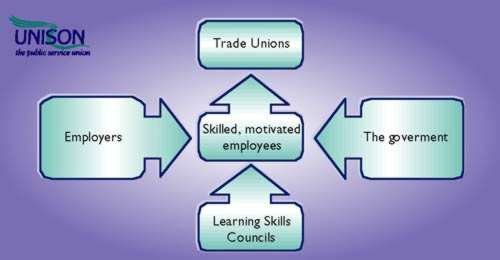UNISON
Formed in 1993 when three public sector unions joined together, UNISON is the UK’s largest union. The merger created a stronger union voice to work collectively to preserve employees’ rights for union members, including the right to belong to a trade union. UNISON has nearly 1.3 million members working in public services Over two thirds are women. Members work in several different industries including healthcare, education, transport, local government the voluntary sector, and call centres.
UNISON believes that many workplace problems can be resolved by negotiation and agreement, and that there should seldom be a need to resort to industrial action such as striking or working to rule.
Ten reasons for joining a union
In a unionised workplace:
- Average earnings are around 8% higher.
- The average trade union member receives 29 days annual holiday compared with 23 days for non-unionised workers.
- Unionised workplaces have health and safety officers to ensure employers keep workers safe.
- In 2000, unions won over £321 million in legal compensation for people who were injured or became ill at work during that year.
- Unionised workplaces are 12% more likely to have in place parental policies that are more generous than the statutory minimum.
- Workers in unionised workplaces are more likely to receive job-related training.
- Workplaces with union recognition are 20% more likely to benefit from an equal opportunities policy.
- Trade union members are only half as likely to be dismissed as non-members.
- Black and Asian trade union members earn 32% more than their non-unionised colleagues from similar ethnic groupings.
- Trade union members can provide and enjoy mutual support where workers are facing exploitation or intimidation for union activity.
Rights in the workplace
Employees have two kinds of legal rights in their employment. Many rights come from Acts of Parliament. These are known as statutory rights, for example, Working Time Regulations provide the right to 4 weeks paid holiday. Other rights are laid down in the contract of employment issued by the employer. In UNISON, many employees work in organisations such as local authorities, National Health Service Trusts, schools and voluntary organisations where there are nationally or locally agreed terms and conditions, which become incorporated into individual contracts.
A contract states the working arrangements agreed between employer and employee. These will relate to pay, holiday entitlement, hours and place of work and the duties expected. The contract provides both the employer and the employee with safeguards. Employees should find out as much as possible about their contract so that they can be sure of their rights if there is a dispute or a disagreement.
To be legally binding, a contract of employment does not have to be in writing. However, there are some particulars that an employer must by law give in writing to the employee not later than two months after you start your job. The terms which must be included are:
- The names of the employer and employee
- The date employment began
- Pay, hours, overtime, holiday and sick pay entitlements
- Pension terms
- Workplace and mobility clauses (circumstances in which workers may be required to change their location and/or do different work)
- Job title and description of duties
- Notice entitlement for both parties
- Disciplinary and grievance procedures
- Reference to any incorporated collective agreements.

An employee is entitled to be paid the UK National Minimum Wage. In October 2003 this was £4.50 for adults (those workers aged 22 and over) and £3.80 for young people aged 18 to 21. From 1st October 2004 the adult rate will go up to £4.85 per hour and the rate for workers aged 18-21 will go up to £4.10 per hour. In addition to this the government has announced that from October 2004 a new rate for 16 and 17 year olds of £3.00 per hour will be introduced.
The Working Time Directive regulates the number of hours and rest periods to which an employee is entitled. For instance, night workers should not average more than eight hours work in each 24-hour period. If an adult works more than six hours, a minimum of a 20-minute rest break away from a work station must be given.
There are some rights which apply specifically to young workers:
- If you are under 18, you are entitled to a daily rest period of 12 consecutive hours in every 24 hour period
- An uninterrupted weekly rest period of at least 48 hours in each 7 day period
- Daily rest breaks of at least 30 minutes if the working day is 4.5 hours or more.
There are many circumstances in which a trade union may become involved in sorting out a dispute between employee and employer. These include:
- Seeking redress where the employer has not followed the correct disciplinary and/or grievance procedure
- Helping an employee who feels s/he has been unfairly dismissed
- Monitoring procedures when an employee is made redundant
- Helping to investigate employees’ claims of discrimination on the grounds of gender, race, religion, sexual orientation, disability and age
- Supporting employees who believe they have been bullied or harassed.
Safeguarding employees´ rights
UNISON is involved in negotiating the best possible working conditions for its members and for workers in general. Sometimes trade unions will work together to negotiate with management on behalf of a whole category of workers within an organisation. This is known as collective bargaining. Collective bargaining gives a great deal of power to the unions involved because they are seen to be in agreement, demonstrating collective strength.
In 2002 UNISON consulted and co-operated with other unions to secure a pay rise for local authority employees. This ranged from 10.9for lower paid workers to 7.7overall over a 2 year period. Before agreement could be reached, 750,000 council staff staged a one-day national strike to highlight low pay in local government. This campaign drew massive support from members and non-members.

The union will negotiate on behalf of a whole section of workers or on behalf of an individual worker, depending on the matter that needs to be resolved. The union can act as mediator between employer and employee, opening up an effective and expert channel of communication that aims to resolve the issue in a fair and democratic way that will satisfy both parties.
UNISON campaigns on issues that will influence decisions which can be resolved only by law. Currently UNISON is lobbying for the minimum wage to be increased to £6.00 an hour and for National Minimum Wage coverage for 16 and 17 year olds. It would also like to see an automatic formula to increase this regularly and substantially.
UNISON works relentlessly to provide support for its members. When Lisa Potts was severely injured during a machete attack at the school where she was a nursery nurse, she was offered £49,000 in compensation. UNISON criticised the compensation system and strove to have the award increased. Lisa eventually received £68,300. The union argued the case that the money she received would never compensate her for the fact that, because of her injuries, she would not be able to return to the job she loved.
Throughout 2003, UNISON local pay negotiators around the UK have been drawing attention to the levels of low pay and poor working terms and conditions suffered by some private contract staff who work inside the National Health Service. These include car park attendants, cleaners, porters and catering staff employed by private contractors but working in hospitals around the country. UNISON has successfully agreed a number of deals around the country to increase the pay of these workers to bring it in line with their NHS counterparts.
Union power

UNISON prefers to resolve disputes between employees and their employer by negotiation. It is only when all negotiations have failed and the membership has been consulted through a vote or ballot th
at the union takes action to settle a dispute. The union will adopt different tactics to place maximum pressure on the employer to compromise.
As with all other unions, UNISON believes it is important that members democratically agree with any action the union takes. When all else has failed, the action taken is known as industrial action. This may take the form of:
- A strike involving all members
- Selective strike action
- Action short of strike action or working to rule
- Refusing to work overtime or unsociable hours.
Other ways of attracting support and publicising issues include running different campaigns around national or regional matters. A local campaign might involve, for example, UNISON resisting the closure of a local school or hospital.
Partnership

UNISON believes that, in the long term, good employer/employee industrial relations are built on partnership between management and employees.
When employees are actively involved in decision-making and problem-solving, productivity increases. That benefits everyone. In ‘high performance workplaces’ there are high levels of trust, a participative management style, and opportunities for employees to develop their skills in ways that motivate them.
Developing partnerships between employers, employees and unions with an active input from other stakeholders such as the government and Learning Skills Councils also helps to increase productivity and to motivate employees. Trade unions believe they have a vital part to play in developing these partnerships.

UNISON is a large, influential union that provides expertise and support for its members. It is through partnership that unions see their role developing; providing pathways for the employer and the employee to work collaboratively, to develop new ways of working, to improve productivity and to increase the skills base of all employees for the good of the country as a whole.



